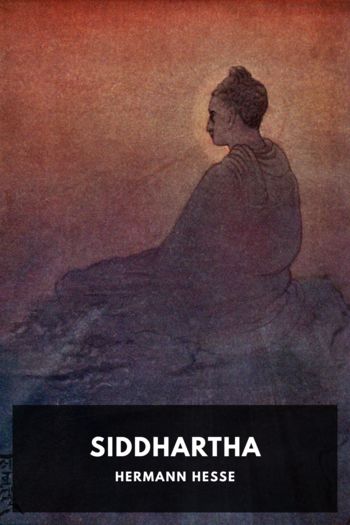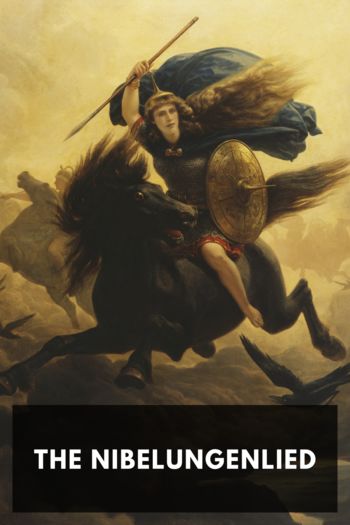Siddhartha, Hermann Hesse [free reads .TXT] 📗

- Author: Hermann Hesse
Book online «Siddhartha, Hermann Hesse [free reads .TXT] 📗». Author Hermann Hesse
By Hermann Hesse.
Translated by Gunther Olesch, Anke Dreher, Amy Coulter, Stefan Langer, and Semyon Chaichenets.
This ebook is the product of many hours of hard work by volunteers for Standard Ebooks, and builds on the hard work of other literature lovers made possible by the public domain.
This particular ebook is based on a transcription produced for Project Gutenberg.
The writing and artwork within are believed to be in the U.S. public domain, and Standard Ebooks releases this ebook edition under the terms in the CC0 1.0 Universal Public Domain Dedication. For full license information, see the Uncopyright at the end of this ebook.
Standard Ebooks is a volunteer-driven project that produces ebook editions of public domain literature using modern typography, technology, and editorial standards, and distributes them free of cost. You can download this and other ebooks carefully produced for true book lovers at standardebooks.org.
Part ITo Romain Rolland, my dear friend
The Son of the BrahminIn the shade of the house, in the sunshine of the riverbank near the boats, in the shade of the Sal-wood forest, in the shade of the fig tree is where Siddhartha grew up, the handsome son of the Brahmin, the young falcon, together with his friend Govinda, son of a Brahmin. The sun tanned his light shoulders by the banks of the river when bathing, performing the sacred ablutions, the sacred offerings. In the mango grove, shade poured into his black eyes, when playing as a boy, when his mother sang, when the sacred offerings were made, when his father, the scholar, taught him, when the wise men talked. For a long time, Siddhartha had been partaking in the discussions of the wise men, practising debate with Govinda, practising with Govinda the art of reflection, the service of meditation. He already knew how to speak the Om silently, the word of words, to speak it silently into himself while inhaling, to speak it silently out of himself while exhaling, with all the concentration of his soul, the forehead surrounded by the glow of the clear-thinking spirit. He already knew to feel Atman in the depths of his being, indestructible, one with the universe.
Joy leapt in his father’s heart for his son who was quick to learn, thirsty for knowledge; he saw him growing up to become great wise man and priest, a prince among the Brahmins.
Bliss leapt in his mother’s breast when she saw him, when she saw him walking, when she saw him sit down and get up, Siddhartha, strong, handsome, he who was walking on slender legs, greeting her with perfect respect.
Love touched the hearts of the Brahmins’ young daughters when Siddhartha walked through the lanes of the town with the luminous forehead, with the eye of a king, with his slim hips.
But more than all the others he was loved by Govinda, his friend, the son of a Brahmin. He loved Siddhartha’s eye and sweet voice, he loved his walk and the perfect decency of his movements, he loved everything Siddhartha did and said and what he loved most was his spirit, his transcendent, fiery thoughts, his ardent will, his high calling. Govinda knew: he would not become a common Brahmin, not a lazy official in charge of offerings; not a greedy merchant with magic spells; not a vain, vacuous speaker; not a mean, deceitful priest; and also not a decent, stupid sheep in the herd of the many. No, and he, Govinda, as well did not want to become one of those, not one of those tens of thousands of Brahmins. He wanted to follow Siddhartha, the beloved, the splendid. And in days to come, when Siddhartha would become a god, when he would join the glorious, then Govinda wanted to follow him as his friend, his companion, his servant, his spear-carrier, his shadow.
Siddhartha was thus loved by everyone. He was a source of joy for everybody, he was a delight for them all.
But he, Siddhartha, was not a source of joy for himself, he found no delight in himself. Walking the rosy paths of the fig tree garden, sitting in the bluish shade of the grove of contemplation, washing his limbs daily in the bath of repentance, sacrificing in the dim shade of the mango forest, his gestures of perfect decency, everyone’s love and joy, he still lacked all joy in his heart. Dreams and restless thoughts came into his mind, flowing from the water of the river, sparkling from the stars of the night, melting from the beams of the sun, dreams came to him and a restlessness of the soul, fuming from the sacrifices, breathing forth from the verses of the Rig-Veda, being infused into him, drop by drop, from the teachings of the old Brahmins.
Siddhartha had started to nurse discontent in himself, he had started to feel that the love of his father and the love of his mother, and also the love of his friend, Govinda, would not bring him joy for ever and ever, would not nurse him, feed him, satisfy him. He had started to suspect that his venerable father and his other teachers, that the wise Brahmins had already revealed to him the most and best of their wisdom, that they had already filled his expecting vessel with their richness, and the vessel was not full, the spirit was not content, the soul was not calm, the heart was not satisfied. The ablutions were good, but they were water, they did not wash off the sin, they





Comments (0)